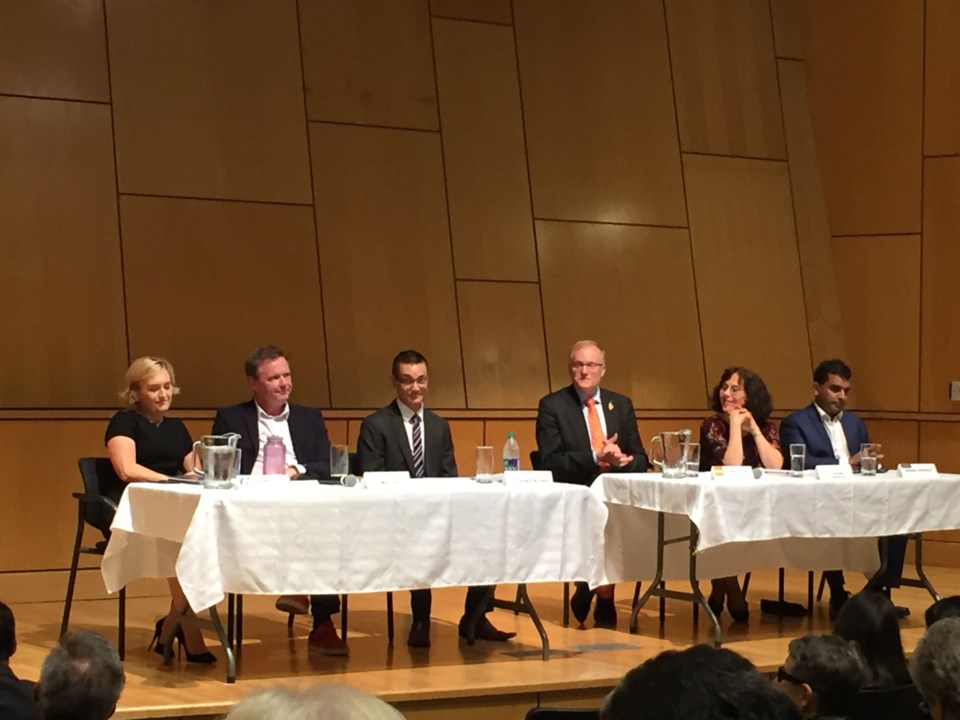Cancelling construction of the Trans Mountain pipeline, building a greener economy and doing nothing are just some of the ways New Westminster-Burnaby candidates would tackle the climate crisis.
In an effort to spotlight environmental issues, New Westminster Environmental Partners, Tenth to the Fraser and Babies for Climate Action hosted a climate change debate on Oct 2 (after The Record’s deadline). As of the Record’s press time, organizers said Peter Julian (NDP), Suzanne de Montigny (Green), and Hansen Ginn (People’s Party) had confirmed they would attend, while Conservative Megan Veck had declined saying she would be door-knocking and Liberal Will Davis said he had another commitment. (Organizers have suggested the candidates’ campaign managers or candidates from nearby ridings could attend to give their party's position.)
The issue of climate change arose at the New Westminster Chamber of Commerce’s all-candidates meeting on Sept. 25.
De Montigny said Canada is heating up twice as fast as anywhere else in the world. She said the Greens wouldn’t build the Trans Mountain pipeline, and would instead invest that $10 to $13 billion, as well as the $3 or $4 billion that goes into gas subsidies, solar farms, wind farms, geothermal energy and tidal energy.
“We take it very, very seriously. We are going to eliminate greenhouse gases by 60 per cent by 2030 and we will have net zero energy by 2050,” she said. “Sorry folks, it’s just way too serious. No one is going to make it. Only we will.”
Julian said climate change is costing the Canadian economy $5 billion a year and that’s estimated to climb to $50 billion in the next couple of decades.
“We are all aware of the impacts of climate change so the idea that the Liberal government has brought forward to ram through the Trans Mountain pipeline makes no sense whatsoever. It is a boondoggle – $17 billion and climbing for something that ultimately leads to a net job loss in British Columbia, let alone the threat to our fisheries and our tourism industries,” he said. “It is, and I say this as a former oil refinery worker, a colossal waste of money.”
Instead of building a pipeline, Julian said the NDP would invest that money in clean energy that would create 300,000 new jobs in the first five years.
In May 2018, Liberal Prime Minister Justin Trudeau announced the federal government would buy the Trans Mountain pipeline, which will carry oil from Alberta to B.C. The federal government’s decision to purchase the pipeline for $4.5 billion came after Kinder Morgan announced it would not proceed with the project.
Davis said the federal government needs to work with Alberta and the oil industry to grow and develop towards a greener economy and a greener infrastructure – fast.
“We are all for that, 100 per cent. Continuing to lead Alberta into diversifying and growing their opportunities is important. But we can’t flip a switch and turn this overnight,” he said. “The Liberal Party of Canada will continue to support the 50 per cent reduction in taxes for green companies innovating, with a ban on plastics by 2021, with net zero by 2050. And also, investing billions of dollars and continuing to diversify this economy and support our change towards a green economy and a green way of living as soon as possible.”
Veck said her party’s platform relies on three core principles: pursuing green technology, not taxes; supporting a cleaner and greener natural environment; and taking the climate change fight global by making sure other countries have access to green technology being created in Canada.
According to Veck, Canada has some of the highest environmental standards and the best human rights standards in the world.
“So it doesn’t really make sense for us to be importing oil from Venezuela, Iran, Nigeria, and other places that don’t have nearly as high standards as us, when we have enough oil to be self-sufficient,” she said. “So we will be working towards energy independence by 2030.”
Libertarian candidate Neeraj Murarka said 95 per cent of emissions coming into the Earth’s atmosphere are from outside of Canada.
“What I am going to do when I am MP for you is I am going to remove all protections from corporations for being sued,” he said. “Do you know why I can’t go into your house and steal something or do something? It’s because I can be sued. These corporations cannot be sued. The Libertarian party is going to make it possible for you to punish industry by taking them to court and using common law against them to prevent any sort of environmental damage.”
Hansen Ginn, the People’s Party of Canada candidate, had a different take on climate change than the other candidates.
“The People Party’s standpoint really is that we are not completely convinced it is manmade climate change. We do admit that the climate changes. That’s just been a constant since the beginning of time. So, our approach to this is really we won’t do anything,” he said. “We are going to let the provinces determine how they want to tackle climate change. But at the same time we want the private sector to really take over and tackle the challenge itself because we believe they are going to be more interested in terms of implementing strategies.”



